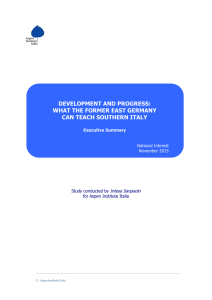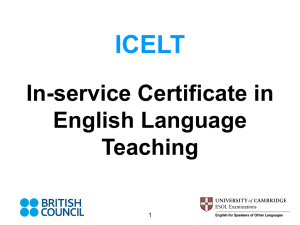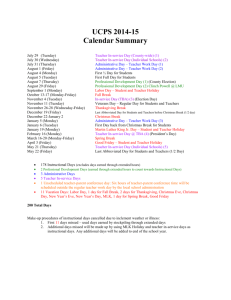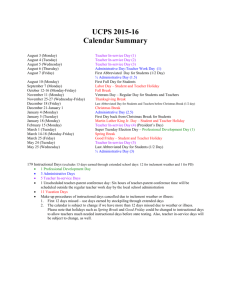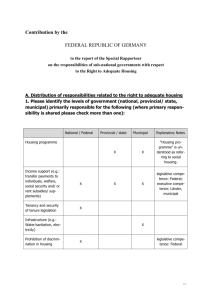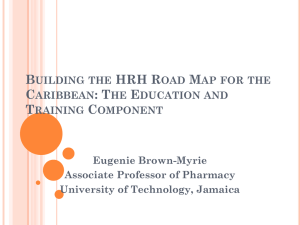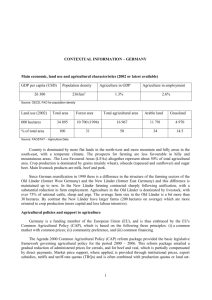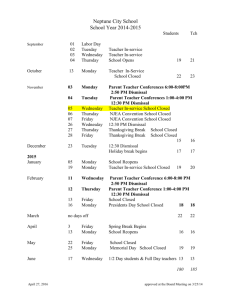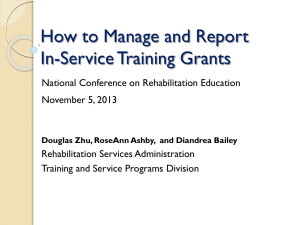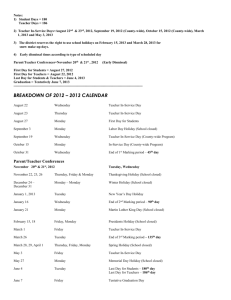Teacher Education in Germany
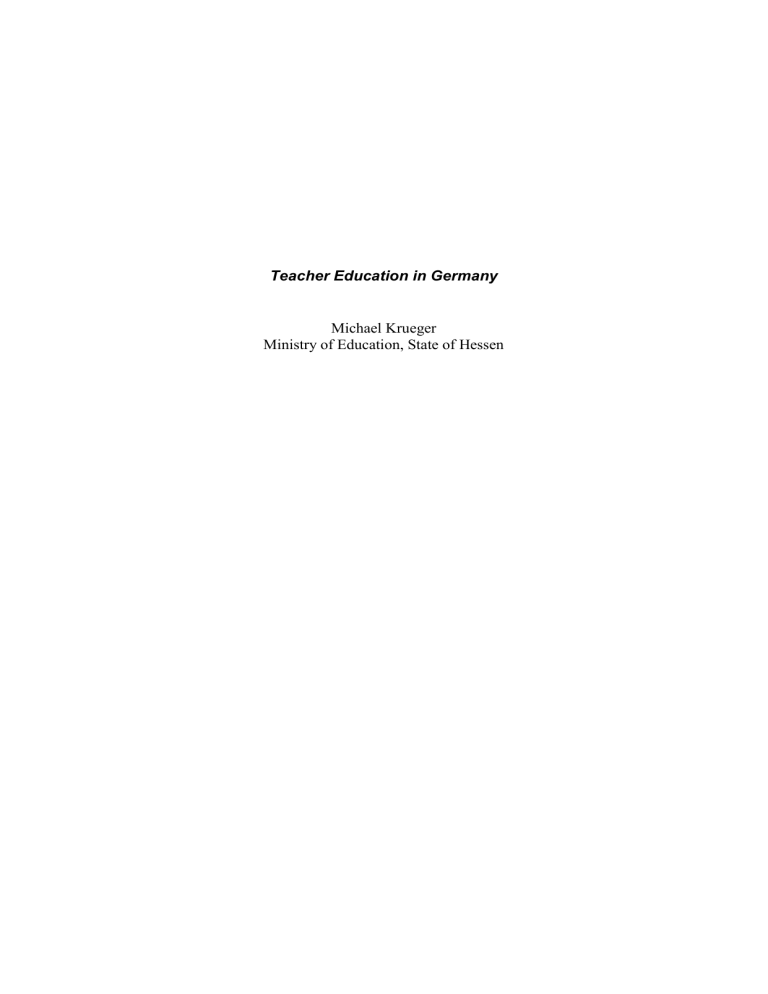
Teacher Education in Germany
Michael Krueger
Ministry of Education, State of Hessen
1. The system of teacher education in Germany 1
Germany is a federal state consisting of 16 federal states (
Länder
). Even though there is a common basic structure in the education system the individual
Länder
are responsible for schooling and teacher education. There is no overall federal authority. To facilitate cooperation between the
Länder
the Standing Conference of the Ministers of Education and
Cultural Affairs provides comparable standards in schooling and and a common framework for teacher education.
Teacher education follows the different levels and different types of school in Germany.
2
Therefore generally speaking there are
primary school teachers,
lower secondary school teachers,
higher secondary school teachers,
vocational school teachers, and
teachers at the various school types for mentally or physically disabled students.
To become a teacher applicants must hold the higher education entrance qualification gained after 13 (or 12 years in some Länder ) years of school.
All teachers receive their training in two stages:
An initial phase of teacher education at a university or a college of art/music.
Duration of studies range from 3-4 years (primary school teaching) to 4-5 or even 6 years
(higher secondary school teaching). The courses must include
–the study of at least two subjects, subject areas or subject groups,
–the study of educational theory and psychology, plus a choice af additional study areas,
–and some practical work at schools.
A second phase of teacher education as a two year practical training at teacher seminars and at selecteacher education training schools.
During this phase the prospective teacher is payed a trainee’s salary, and thus has to hold lessons that are not supervised by a teacher trainer.
At the end of this phase the student teacher will have to submit a major paper usually on the didactics of one of the subjects studied at university, one practical teaching examination in each subject, oral examinations on didactic and methodical issues, on educational theory, on legal issues of school and education and other educational areas.
As a rule teachers are public servants i.e. they are employed by the state or rather the 16
Länder, with few exceptions in the small private school sector. This explains why German teachers have to pass a state examination to finish their university studies, and a second state examination at the end of their practical training phase. An academic degree would not be sufficient to become a state employed teacher.
1 This text is based on chapter 10 of the following publication: Secretariat of the Standing Conference of the
Ministers of Education and Cultural Affairs of the Länder in the Federal Republic of Germany (ed.), The
Education System in the Federal Republic of Germany. Information Dossier for the Education Information
Network in the European Union. Bonn 1994.
2 For details see Ewald Terhart’s contribution to the Loulé conference.
2. Teacher In-Service Training
Teacher in-service training underlies different philosophies in the
Länder
. Some leave teacher in-service training to non-state institutions or to individual initiatives, some offer in-service seminars only to so-called multiplicators, and others offer regional school based in-service courses. The state of Hessen for instance runs a well established system of local, regional and cenral in-service courses. Whatever the system is at the moment crucial questions are being put as to costs and effectiveness.
3. Further teacher education
Courses are being offered either by state agencies or by universities. for teachers wanting to add a new teaching subject to their initial qualifications or wanting to teach at a different level or different type of school
The mere fact of the necessity of these courses indicate the rather rigid structure of the education system.
4. Challenges and perspectives
The current discussion on teacher education in Germany focuses on general political issues and on more specific structural issues.
Politicians question the status of teachers as state employed civil servants, and they discuss costs of teacher education at universities.
The more topical discussion of education policy makers has recently found one common denominator. This is the report of a federal committee working under the auspices of the
Standing Conference of the Ministers of Education
3
.
The report contains a vast number of recommendations out of which a few shall be mentioned:
The initial stage of teacher education at universities should be reorganised to become better orientated towards professional needs of teaching. The so far purely scholarly studies should put more emphasis on education, methods and didactics. Studies should also include more field work at schools.
Different university faculties educating prospective teachers should cooperate. The report recommends the establishment of centres for teacher education within universities.
Course contents, aims and objectives of university teacher education and of the practical second phase of teacher education at teachers‘ seminars should be harmonized.
Teacher in-service training should be part of the system to further continuous professional development.
The report makes it mandatory to develop core criteria and to describe a common core curriculum for teacher education. It is suggested to conduct a comparative evaluation study of teacher education in the different
Länder
of Germany.
Additional motivation to restructure the German system of teacher education has been brought about by the intensified development of the European Union. The problem of teacher mobility in Europe can only be solved by making standards comparable.
3 Terhart, Ewald (ed.), Perspektiven der Lehrerbildung in Deutschland. Abschlussbericht der von der
Kultusministerkonferenz eingesetzten Kommission. Weinheim und Basel: Beltz 2000.
